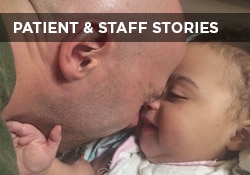This website uses cookies so that we can provide you with the best user experience possible. Cookie information is stored in your browser and performs functions such as recognising you when you return to our website and helping our team to understand which sections of the website you find most interesting and useful.

Susan E. Mazer, Ph.D. Blog
Thoughts and ideas on healthcare
Hi, and welcome to my blog! I'm Susan E. Mazer -- a knowledge expert and thought leader on how the environment of care impacts the patient experience. Topics I write about include safety, satisfaction, hospital noise, nursing, care at the bedside, and much more.
Ethos, Conscience, and The Patient Experience
March 9, 2018
 It’s possible to argue that these three concepts have little in common. On the other hand, they are so blended that healthcare providers cannot excel without considering all of them.
It’s possible to argue that these three concepts have little in common. On the other hand, they are so blended that healthcare providers cannot excel without considering all of them.
I have long written and spoken that providing a therapeutic environment — one that addresses both medical and non-medical needs of patients and families, is an ethical obligation. That placing patients in rooms that feel like prison cells when they are already victims of their condition is almost immoral.
“Almost” because the details of their situation perhaps can give way to understanding how this happens — nurses who have too many patients to care for, under-funded community hospitals, and overcrowded emergency rooms where so many patients are placed at the bottom of the list. These things tug at the conscience of the whole system.
What is Conscience?
“Conscience,” what sits on our shoulders and lets us be most uncomfortable with that which conflicts with our sense of rightness, is formed prior to medical or nursing school and prior to applying for any job. It should show up every day, every minute.
But it is not talked about in relationship to healthcare or the patient experience.
An environment that is emotionally toxic, that is cluttered and without any evidence of human caring, begs the sense of doing what is right to fix it for those who know how it’s affecting patients. That’s conscience.
What’s the definition of conscience? Here’s what I found:
CONSCIENCE
noun
1. the inner sense of what is right or wrong in one’s conduct or motives, impelling one toward right action: to follow the dictates of conscience.
2. the complex of ethical and moral principles that controls or inhibits the actions or thoughts of an individual.
3. an inhibiting sense of what is prudent:
I would do ______but my conscience would bother me.
Patient Experience Movement Demands Conscience
With its call to address the whole patient and be sensitive to the details of the lived-experience, the patient experience movement demands conscience. And it shouldn’t just become one more requirement of healthcare workers’ jobs. Like being honest, civil, or considerate.
When nurses see patients suffering, doing what is necessary (which may involve taking steps that are inconvenient), is a moral imperative and part of their professional ethics.
When a housekeeper finds a patient stuck in a bathroom because he or she cannot stand, getting help or helping, taking immediate steps is a human act of conscience and caring.
The “ethos” of an organization is the fundamental character or spirit of a culture; the underlying sentiment that informs the beliefs, customs, or practices that define who you are as part of a healthcare organization. It is evidenced by the day-to-day assumptions you make and your expectations of others.
Prisoners are Patients Too
The New York Times recently reported on terminally ill prisoners who are no longer a danger to society being denied compassionate release so that can die with their families.
From the article: “Officials deny or delay the vast majority of requests, including that of one of the oldest federal prisoners, who was 94, according to new federal data analyzed by The Marshall Project and The New York Times. From 2013 to 2017, the Bureau of Prisons approved 6 percent of the 5,400 applications received, while 266 inmates who requested compassionate release died in custody. The bureau’s denials, a review of dozens of cases shows, often override the opinions of those closest to the prisoners, like their doctors and wardens.”
These prisoners are patients in a different system. But in every community, patients may die alone because their families are elsewhere; the homeless often die on the streets within blocks of hospitals. Children may be left alone in a family shelter.
Healthcare providers cannot fix all of this, but they should be able to address what they see right in front of them.
Doing What is Right
The ethos of a healthcare organization and its community are its assumptions about what is right, fair, and life-supporting. Conscience nudges individuals and organizations when their actions or inactions are in conflict with what they know is right.
Where do conscience and ethos fit into your organizational structure? Where do conscience and ethos make doing the right thing considered before a policy can be written that affects the patient experience?
P.S. If you like this post, please do me a favor and share on LinkedIn, Twitter, Facebook, etc. Also to get automatic notices when a new post is published, please subscribe. No spam – just great content. Thanks!










